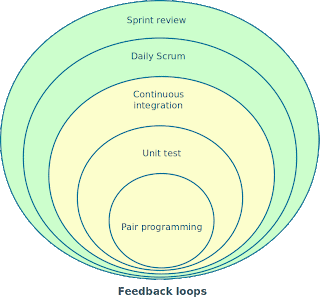Agile methodologies are successful because they are empirical, incremental and iterative; every action is examined and feedback is generated such that improvement is attained by taking small refining steps. Running scrum with XP generates feedback (TDD, pairing) as often as every few minutes!
I wasn't to be put off that easily however, what about Van Gogh I asked? He never sold a single a painting while he was alive, and when he paired with Gauguin it ended in tears. If Van Gogh had heeded the feedback he received on the fruits of his artistic endeavours he would have given up long before he got to Arles and the world would have been a poorer place for it. Art is not science was the rejoinder. There is a science to art though, and an art to science.
What about music then, it's still art but art with an explicitly mathematical character, how do great musicians deal with feedback? Beethoven was stone deaf by the time he wrote his majestic 9th symphony, a symphony which to this day sets the standard for all other symphonies. When Stravinsky's Sacre du Printemps was first performed some ninety years later there was a riot! The composer (and the choreographer, who was also a touch too modern for the tastes of Paris' beau monde) were nearly run out of town. The press was almost unanimous in its condemnation of this newfangled noise and the weird dancing that went with it. These days, Sacre du Printemps is regarded as one of the masterpieces of twentieth century music. As for Schoenberg...
I wasn't convincing however, art was far too subjective (we hadn't even touched on literature yet), and that's exactly why creative geeks get into software; a bit is either on or off. Feedback is always good. And Schoenberg really is unadulterated noise!
However, new research would seem to indicate that I may not have been entirely misguided in my playful challenging of the virtues of feedback. Creative ideas tend to generate resistance, even among people explicitly seeking innovative breakthroughs, and regardless of objective evidence supporting the new idea!
So, when is negative feedback a sign that you need to change your ways and when is it a sign that you are most definitely on the right track? There is no simple answer to that question. As a rule I would err on the side of responding to feedback at face value but try and allow for the occasions when feedback says one thing but means another. In fact, this is a specific instance of a generic problem with all process guidelines, and a topic of hot debate in the scrum community;
- When does a product owner challenging a team become a manager pressuring the team?
- When does guarding the process become procedural nit-picking?
- When does positive conflict become damaging mudslinging?
- When does the avant garde represent the emperor’s new clothes?
- Etc.
In all cases the answer is (a sometimes seriously unsatisfying), “it depends”. And that is the art to this science of software development.

No comments:
Post a Comment